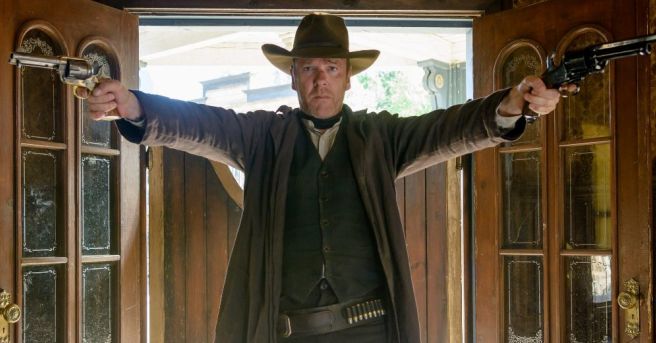
The action opens with John Henry Clayton returning to his old home to a cold reception by his father Reverend Clayton. His mother has passed away, and the Reverend doesn’t take pains to hide his opinion of his “gunman” son. John Henry left for the Civil War with promises to return to his family, and to his love Mary Ellen, but has been gone for years, with nothing but dramatic tales of his violent exploits returning home on his behalf. Here is already a classic western motif, the Civil War soldier who was so scarred by battle that by the war’s end he knows no other life than one of violence.
John Henry claims to have put his guns away, which is also a standard motif for the gunfighter in many films. His father has doubts, as do we, because of course, a peaceful man does not a western movie make.
As you might expect, there is a greedy rancher named James McCurdy (played by Brian Cox) who is forcefully buying up all the nearby properties, offering reasonable (or less so) payments, and bullying and forcing sales through violence when necessary.
Early in the film, John Henry meets his antagonists in the saloon, where he has gone to get a soft drink. This scene plays out very similarly to the classic western Shane, which features a soda-drinking hero. As an aside, Eastwood reprises this to a smaller extent in Unforgiven with the shootist who has given up drinking. Here he meets Gentleman Dave, played by Michael Wincott. The other gun hands think John Henry is going to be a pushover, but Gentleman Dave recognizes John Henry for who he is, and is not distracted by his apparent nonviolence. The Gentleman Dave character seems to me to be modeled on a Doc Holliday mold, and I am eager to see what else Wincott has played, or may play in the future. Gentleman Dave is a hired gun, and is not afraid to shoot people, but he also distinguishes himself as being a businessman rather than simply bloodthirsty.
Forsaken follows a fairly genre standard approach in which John Henry stands up for a homesteader who is being bullied in town by McCurdy’s men. He is beaten, but refuses to become violent himself. This nonviolence will be tested, of course, and when McCurdy’s mean stab Reverend Clayton John Henry straps his guns on again. He carries a Colt (of course), but before he heads to the saloon to confront McCurdy and his men he also stops in a gunshop and buys a second weapon. Forgive my geeking out here, but he buys a LeMat, which was a French-made revolver that was used by the Confederacy during the Civil War. It’s an impressive piece, with a nine shot cylinder and a 20 gauge shotgun barrel underneath the primary barrel. The inclusion of this piece is something of a historical anomaly, as these pistols were fairly rare and by the time of this film it would’ve been a highly unlikely choice for a secondhand purchase - but I’ll give it to them just because seeing one on film delighted me.
The fight ensues, and it’s a top-shelf, bar-jumping, table flipping movie gun battle. I won’t spoil too much, except to say that before it’s all over, only McCurdy himself (barricaded upstairs) and Gentleman Dave remain. Gentleman Dave and John Henry find themselves on the street in what is shaping up to be a classic “high noon” kind of showdown. John Henry tells Dave that he has no fight with him, that he could just walk away. Gentleman Dave counters that he accepted a contract with McCurdy, and his reputation would be ruined if he abandoned a client. John Henry notes that he’s down to his LeMat, which is heavy and gives Dave an unfair advantage; he asks leave to go fetch his Colt. Dave assents, and John Henry goes inside to get it. While there he encounters McCurdy and kills him, leaving only Gentleman Dave standing.
Here’s where the film subverts the audience expectations - now that his boss is dead, Gentleman Dave is free to walk away from the fight, and he does exactly this. I think this is a brilliant twist on the genre and elevates this film above many others who simply tick off genre staples in predictable ways.
Finally, there is Mary Ellen, played by Demi Moore. She plays this nicely, with understated makeup - while she is still a beautiful woman, she very much looks the part of an older frontier woman; the film resists the impulse to make her too beautiful. She is married, having tired of waiting for John Henry to return, and the couple dance with the romantic tension that remains between them throughout the film. Theirs is a beautiful story of unrequited love.
So Forsaken may not be the best western ever, but it’s certainly one worth watching, and if you’re a fan of the genre, probably owning. Go to Amazon and buy it now!
amzn.to/2ppjxPH
 RSS Feed
RSS Feed
